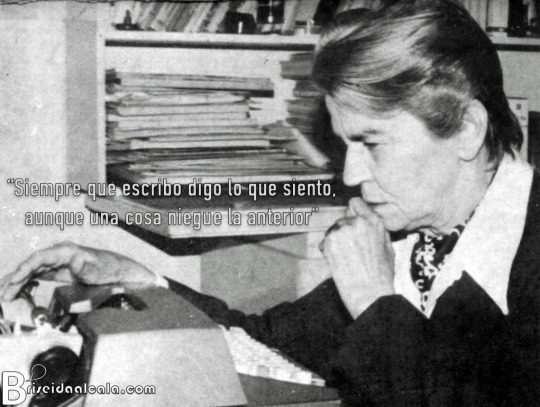#josefina vicens
Quote
I can't live on only my cold truths, on the concepts I can synthesize in three lines. I must also live on my weaknesses,, my dualities, and admit that those three logical, upstanding lines that faithfully reflect me in a given moment can become, on another not-very-distant occasion or in a complicated and turbulent mood, meager or narrow or painful, without ever ceasing to be true.
Josefina Vicens, The Empty Book (trans. David Lauer)
#q#lit#quotes#prose#josefina vicens#the empty book#fragments of selfhood#personal#reading#mexican lit#favourite#archive#m#x
249 notes
·
View notes
Text
"... Con esa imagen, y un dolor torvo y punzante, me acostaba todas las noches a no dormir o a soñar con ella.
Ahora vivo más tranquilo. Permanece en mí, ya lo he dicho, pero tan en el fondo, que siento su existencia, pero no su presencia. ¿Cómo podría explicar esto? Sé que está en mí, constantemente, porque basta que desee recordarla o que algo me la recuerde, para que aparezca con mayor claridad. Eso demuestra su existencia. Ahora bien, si el recordarla no fuera un acto voluntario o casual, sino permanente y obsesivo, es decir a pesar de mí mismo, sentiría yo, además de su existencia, su presencia. Y en realidad casi no la recuerdo. Lo que no he olvidado ni olvidaré jamás es mi desesperado amor por ella. No sé si esto equivale a seguir amándola. Tal vez..."
Josefina Vicens. El libro vacío, fragmento.
3 notes
·
View notes
Text
if i had a nickel for every book i read this year in which the narrator's last name is the same as mine i'd have 2 nickels, which isn't a lot but it's weird that it happened twice
#the books are The Empty Book by Josefina Vicens and The Savage Detectives by Roberto Bolaño#if you even care
7 notes
·
View notes
Text
Anatomy of Failure
I felt like I was on trial watching Anatomy of a Fall -- for my failures as a writer and the ensuing resentments misdirected at my partner. Seeing my private torments litigated in a riveting courtroom drama, spoken in clinical French, was titillating. The writing was so sharp I could’ve just listened like the blind son Daniel and been engaged. But I loved watching Daniel practice piano, the baby blue glaze over his eyes and his surprise testimony in a redrum turtleneck.
The story wastes no time. Within five minutes, the husband is found dead, bleeding out in the snow. An autopsy cannot rule out foul play and his wife, a writer, becomes the sole suspect. What unravels in court is not only the events that precipitated the death of her husband, but an ultimate tea concoction of their strained relationship, competing literary ambitions and the blame and guilt surrounding the accident that blinded their son.
Entering a foreign court is a bit jarring. The rules, procedures and dress are notably different from America and seem silly when defamiliarized. The prosecutor, a bald little gremlin robed in red, was probably my favorite character. Arched, dry and eloquent, he bludgeoned the accused writer with an avalanche of incriminating evidence and was quick to undercut any counter/argument from the defense. Court rules in France appear to allow more cross-talk, making the arguments more conversational than U.S. court dramas, which glorify long-winded monologues.
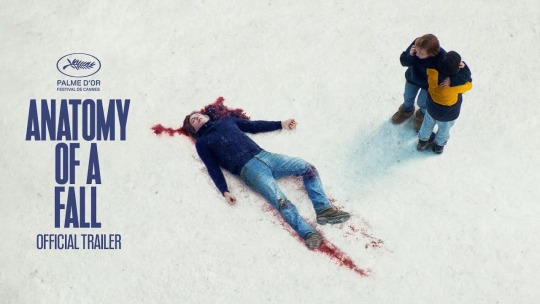
Impressively, the writer/director thread the needle so well that one is never quite convinced one way or the other. I am easily persuaded and in this lawyerly tug of war, I felt myself suspended over a chasm with demons of jealousy, envy and pride snapping at my feet.
For all the talk of literary failure, this was a written masterpiece. I am drawn to such stories, like a moth to flame, for so many deep and cutting reasons. Like the husband, I deflect and blame others for my shortcomings: If only X, Y and Z were different, then I could write! The wife’s gaslighting voice lives within me too: Make the time and do it, coward! And I disdain my father for giving up sports journalism, and for withholding those ambitions from me (Had I known earlier, maybe then I’d be a staff writer!) and on himself in general.
Funny enough, when I was biking home after seeing Fallen Leaves last week, I had the high thought that my senior thesis anticipated my current condition with regards to writing. My argument was garbled -- something about the author subverting masculine forms/expectations of writing (adventure, heroism) using feminine forms (diary, domesticity) through an act of ventriloquy -- but the book I chose to write about was a book about a wannabe writer’s failure.
Called El Libro Vacio and written by Josefina Vicens, it was a novel about the shortcomings of a middle class man working in middle management and his literary shortcomings. He wanted to be a great writer, but he was tormented and uninspired by the banality of his day-to-day life as a family man. If only he didn’t have a kid and wife, he could hit the road and sail the high seas and finally have something to say! He studiously documents his failures and torments in a diary that amounts to the novel by Vicens.
In my early 20s, I was interested in what makes a good leader. I studied the polar explorer Ernest Shackleton, the most winningest basketball coach Gregg Popovich and read more than a dozen presidential biographies. But now I find myself fixated on failure, my own and my fathers, and I want to learn the art of letting go.
2 notes
·
View notes
Text
Yo podría hablarte de lo que es estar allá abajo, contigo, en tu aparente muerte, y de lo que es estar aquí arriba, contigo, en mi aparente vida.
Un día cualquiera, por algo que sucede o por alguien que lo ordena, uno deja de ser lo que era. Deja de respirar o sigue respirando. Es igual. Otros miden el cuerpo, lo colocan en una caja negra con forros de raso blanco, lo meten en una fosa honda y lo cubren de tierra. O miden el cuerpo, lo visten con un traje de luto, lo llevan a un sitio extraño y ahí lo dejan, a la intemperie. Allá abajo el cuerpo espera quieto y a su tiempo empieza a vivir su transformación. Acá se queda quieto también, sorprendido, atemorizado, invadido, pero no se transforma ni se aniquila: permanece igual y ya no es igual.
~ Los años falsos; Josefina Vicens
24 notes
·
View notes
Text
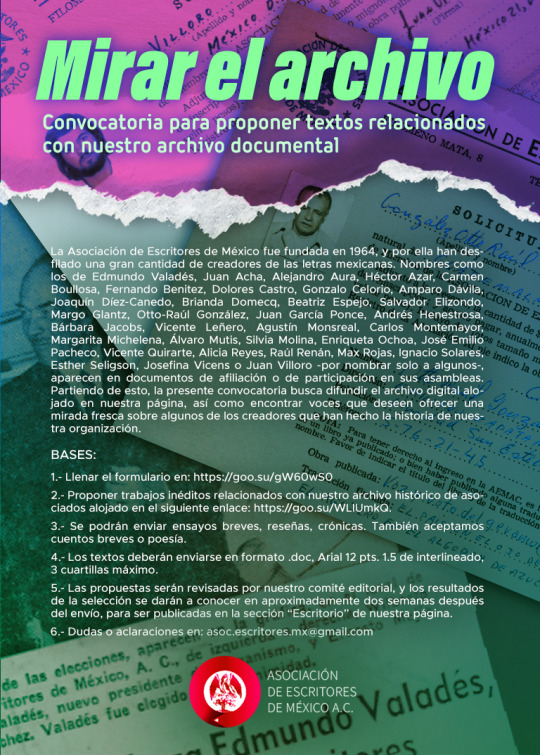
Creación y curaduría de la convocatoria «Mirar el archivo»
"La Asociación de Escritores de México fue fundada en 1964, y por ella han desfilado una gran cantidad de creadores de las letras mexicanas. Nombres como los de Edmundo Valadés, Juan Acha, Alejandro Aura, Héctor Azar, Carmen Boullosa, Fernando Benitez, Dolores Castro, Gonzalo Celorio, Amparo Dávila, Joaquín Díez-Canedo, Brianda Domecq, Beatriz Espejo, Salvador Elizondo, Margo Glantz, Otto-Raúl González, Juan García Ponce, Andrés Henestrosa, Bárbara Jacobs, Vicente Leñero, Agustín Monsreal, Carlos Montemayor, Margarita Michelena, Álvaro Mutis, Silvia Molina, Enriqueta Ochoa, José Emilio Pacheco, Vicente Quirarte, Alicia Reyes, Raúl Renán, Max Rojas, Ignacio Solares, Esther Seligson, Josefina Vicens o Juan Villoro -por nombrar solo a algunos-, aparecen en documentos de afiliación o de participación en sus asambleas. Partiendo de esto, la presente convocatoria busca difundir el archivo digital alojado en nuestra página, así como encontrar voces que deseen ofrecer una mirada fresca sobre algunos de los creadores que han hecho la historia de nuestra organización."
0 notes
Text
Josefina Vicens // "It is only in the body of a person whom we have loved deeply for a long time that we don't perceive the passing of time, and that growing old with that person is a way of never growing old. Seeing someone from day to day has a slow, compassionate rhythm. The people who live at our side always exist in the most immediate time: yesterday, today, tomorrow; and we can't see this shrunken distance; we don't see the effects of the passing years. I realize that my wife has aged only when I see old photographs. And not even then, because they were taken in surroundings so different from the present ones and in such ancient clothing that I look at them as if they weren't of her... Her aging hands, her eyes surrounded wrinkles, and her grey hair don't surprise or displease me or make me remember the smoothness of her skin and her black hair of a former time. The changes have occurred so slowly and are so intimately tied to my own that neither she nor I has been able to notice them. I think the great miracle of sharing your life is not perceiving the brutal destruction, the annihilation of the body that you love."
0 notes
Text
“#Nada es #fijo ni permanece #inmóvil en el trémulo #corazón del #hombre” #JosefinaVicens #ElLibroVacío #novela @transito_libros Mi #reseña @MondeDiploEs #FelizDomingo @CulturaAND @casadellibro @rc_arce @martacamnu @AlveaAna @gemis46 @masleer @PacoToskano
#letras#arte#reading#librodereflexion#leoycomparto#librosycafe#amoloslibros#autores#autoras#lectoresunidos#lecturas
0 notes
Quote
Yo sí sé lo que significa el no pronunciar las palabras que me devolverían la vida. Las tengo ensayadas, desesperantemente ensayadas. En el momento en que me decidiera surgirían fluidas y rotundas. Inapelables. Son redondas, pulidas. La frase completa es como una joya. La tengo, es mía. La veo brillar en medio del silencio. Con sólo pronunciarla todo me sería devuelto. Pero allí permanece, al borde de mis labios, como al borde de un río crecido, imposible de cruzar.
¿Sabes lo que es quedarse a la orilla de uno mismo, contemplándose?
Josefina Vicens / Los años falsos
10 notes
·
View notes
Text
brief primer for the hopeless days, pt. IV
"I felt I should embrace him and tell him not to suffer; that he wasn't alone, that I was his friend and we were living on the same planet, at the same time, in the same country; that now the two of us were in the same park, on the same bench; that human beings should talk to each other, be aware of each other, and love each other; that each man who passes by offers us the chance for companionship and warmth."
Josefina Vicens, The Empty Book (tr. David Lauer)
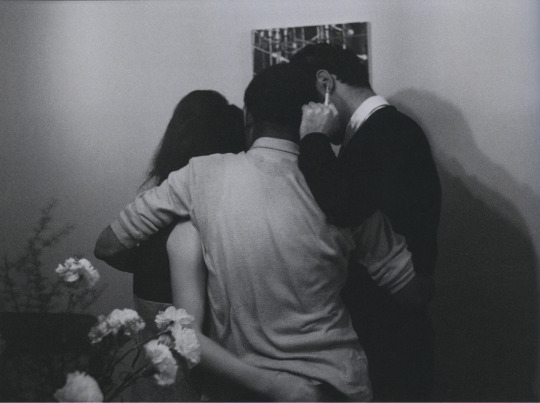
[James Baldwin & Friends, Istanbul. ph. Sedat Pakay]
"On love: always the great gestures, or that it is incompatible with ambition and individuality. Rarely the small gestures, rarely that these make the other accomplishments possible. A work in progress. A chain of kindnesses fashioned a link at a time. Clumsy effort, but effort nonetheless."
Katie Ward, Girl Reading

Paul Eluard, “Gabriel Péri” tr. Gilbert Brown

[Two old men hand in hand rush for taking place for prayer time in the Yeni Cami mosque in Istanbul. ph. Marco Vacca]
"We find comfort only in
another beauty, in others'
music, in the poetry of others.
Salvation lies with others,
though solitude may taste like
opium. Other people aren't hell
if you glimpse them at dawn, when
their brows are clean, rinsed by dreams."
Adam Zagajewski, “Another Beauty”, tr. Clare Cavanagh

"We are sun and moon, dear friend; we are sea and land. It is not our purpose to become each other; it is to recognize each other, to learn to see the other and honor him for what he is: each the other’s opposite and complement."
Hermann Hesse, Narcissus & Goldmund
"Down the road there is an old man who sits in a chair under the porch of his front door to enjoy the sun. He is very old. In fact, he is dying. And because I know this, every time I pass him I pass the time of day with him. I tell him he is getting brown in the sun. Or he asks me about the price of the vegetables in my shopping bag – once he lived in the country – and I answer him at length and with great warmth. Why do I do this? It is a natural reaction. Soon he will die [and] I want him between now and then, and perhaps even at the moment of dying, to have good thoughts, not of me personally, but of the living, of the world he leaves. I want to give him reason for thinking the best possible thoughts."
John Berger, A Painter of Our Time
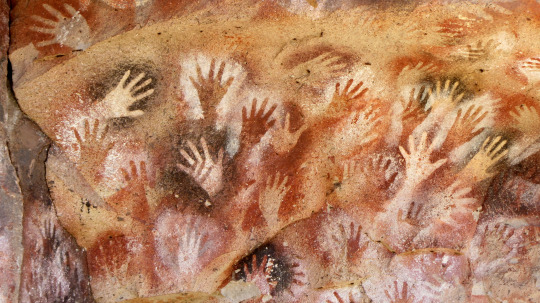
[waves of handprints dating between 7,300 BC & 700 AD, Cueva de las Manos (Cave of Hands), Santa Cruz, Argentina. ph. Pablo A. Gimenez]
“Something strange happens when people are in a small boat, something that rarely happens with people in a car or an elevator, in a train or even a boat large enough to say that you are on it instead of in it. What they experience is the sense of solitude. There are only a few thin boards keeping them from being totally engulfed by the surrounding deep sea. They are lonely, but it’s not an isolated loneliness, because they feel lonesome together, together with others in the boat. This is why a temporary bond forms between people in a small boat. They only have each other, the deep sea is frightening, and small boats are very fragile. Therefore, each one of them becomes the other’s lifebuoy. If you’re not afraid, then neither am I, so we shouldn’t scare each other, and we ought to be nice to each other as long as the water surrounds us.”
Stig Dagerman, A Moth to a Flame (Burnt Child), tr. Benjamin Mier-Cruz

["The Ride Home", submitted by slyburger13 r/AccidentalRenaissance]
"I tried to focus on something small, the smallest thing I could think of. Someone once made this pew I’m sitting on, I thought. Someone sanded the wood and varnished it. Someone carried it into the church. Someone laid the tiles on the floor, someone fitted the windows. Each brick was placed by human hands, each hinge fitted on each door, every road surface outside, every bulb in every streetlight. And even things built by machines were really built by human beings, who built the machines initially. And human beings themselves, made by other humans, struggling to create happy children and families. Me, all the clothing I wear, all the language I know. Who put me here in this church, thinking these thoughts? Other people, some I know very well and others I have never met. Am I myself, or am I them? Is this me, Frances? No, it is not me. It is the others. Do I sometimes hurt and harm myself, do I abuse the unearned cultural privilege of whiteness, do I take the labor of others for granted, have I sometimes exploited a reductive iteration of gender theory to avoid serious moral engagement, do I have a troubled relationship with my body, yes. Do I want to be free of pain and therefore demand that others also live free of pain, the pain that is mine and therefore also theirs, yes, yes.”
Sally Rooney, Conversations With Friends

[”Pale Blue Dot”: photo of Earth taken by the Voyager 1 space probe]

[anonymous, Jan. 15, 2022]

Alain de Botton, Essays in Love
"A single stranger sleeps next to me and I feel like a whole crowd has come in with him. He hasn’t said anything to me, I haven’t said anything to him, but I feel I have nothing else to say to him, nor to hide from him."
Mihail Sebastian, For Two Thousand Years (tr. Philip Ó Ceallaigh)

[tiktok @ shanrizwan]

Michael Onyebuchi Eze, Intellectual History in Contemporary South Africa

[”A full bottle of wine just rolled out from under a subway seat and now these 2 strangers popped it open & are drinking it. This is peak NYC”, ph. Colleen Hagerty]
"Nobody can claim that humanity is in the process of decay without having observed the same putrid symptoms in himself. Nobody can say that humanity is evil without he himself having been part of evil deeds. There is no such thing as unshackled observation. He who lives is the life-long prisoner of humanity and contributes, willingly or unwillingly, to an increase or decrease of the human inventory of happiness and misfortune, greatness and humiliation, hope and despondence […] the fate of humanity is at stake everywhere and at all times, and the responsibility of one life for another is immeasurable."
Stig Dagerman, "Do We Have Faith in Humankind?"
#feeling....things and things and things#compilation#a brief primer for the hopeless days#without tenderness we are in hell#m#x
1K notes
·
View notes
Text
"...Sollocé inconsolable por lo que se me moría, antes de vivirlo. Sin saberlo, creyendo que lloraba por mí, en realidad lloraba por los dos más agrios dolores del hombre: el amor y el adiós..."
Josefina Vicens. -El libro vacío, fragmento.
1 note
·
View note
Text
Seeing someone from day to day has a slow, compassionate rhythm.
It is only in the body of a person whom we have loved deeply for a long time that we don’t perceive the passing of time, and that growing old with that person is a way of never growing old. Seeing someone from day to day has a slow, compassionate rhythm. The people who live at our side always exist in the most immediate time: yesterday, today, tomorrow; and we can’t see this shrunken distances; we don’t see the effects of the passing years. I realize that my wife has aged only when I see old photographs. And not even then, because they were taken in surroundings so different from the present ones and in such ancient clothing that I look at them as if they weren’t of her, as if the portrait represented not my wife but a character similar to her […] Her aging hands, her eyes surrounded wrinkles, and her grey hair don’t surprise or displease me or make me remember the smoothness of her skin and her black hair of a former time. The changes have occurred so slowly and are so intimately tied to my own that neither she nor I has been able to notice them. I think the great miracle of sharing your life is not perceiving the brutal destruction, the annihilation of the body that you love.
— Josefina Vicens, The Empty Book (trans. David Lauer) (University of Texas Press; February 1, 1992)
45 notes
·
View notes
Quote
"Quisiera por lo menos, poder explicar lo que siento, para que se comprenda por qué escribo, por qué no puedo romper nada.
Hablo de angustia, de atracción, de abismo, pero estas palabras no reflejan lo que quiero decir; son burdas aproximaciones. Lo que quiero decir es otra cosa.
El libro vacío, Josefina Vicens.
7 notes
·
View notes
Text
Pero en esto de escribir, ¿quién me obliga, a quién tengo que rendir cuentas, con quién me he comprometido? Ni siquiera conmigo mismo, porque jamás he estado conforme con hacerlo. Lo entendería si fuera yo como esos artistas que saben y sienten que sobre todo lo demás, siempre, en cualquier circunstancia, está su obligación y su placer de expresarse. Pero yo no soy un artista. Si realmente lo fuera tendría dentro de mí la certeza, aunque tal vez por modestia no lo exteriorizara. Mi mujer, mis hijos, mi trabajo, no serían el centro de mi vida, sino el contorno, la línea tenue que la enmarcara, pero no el marco rígido e inalterable. El artista es un ser distinto, vulnerable, asombrado, trémulo, herido de nacimiento y por vida, difícilmente incorporable a la realidad diaria. Claro que existe el que de esa realidad extrae sus mejores elementos. Pero el notarla tanto como para poder manejarla y convertirla en obra de arte, es la mejor demostración de que no ha podido incorporarse a ella, de que no ha sido devorado por ella. La describe con tal verdad que es como si le arrancara un trozo. Lo que tiene de distinto es lo que sólo el gran artista logra: que esa realidad la conocemos de siempre y, no obstante, la notamos por primera vez.
~ El libro vacío, Josefina Vicens
13 notes
·
View notes
